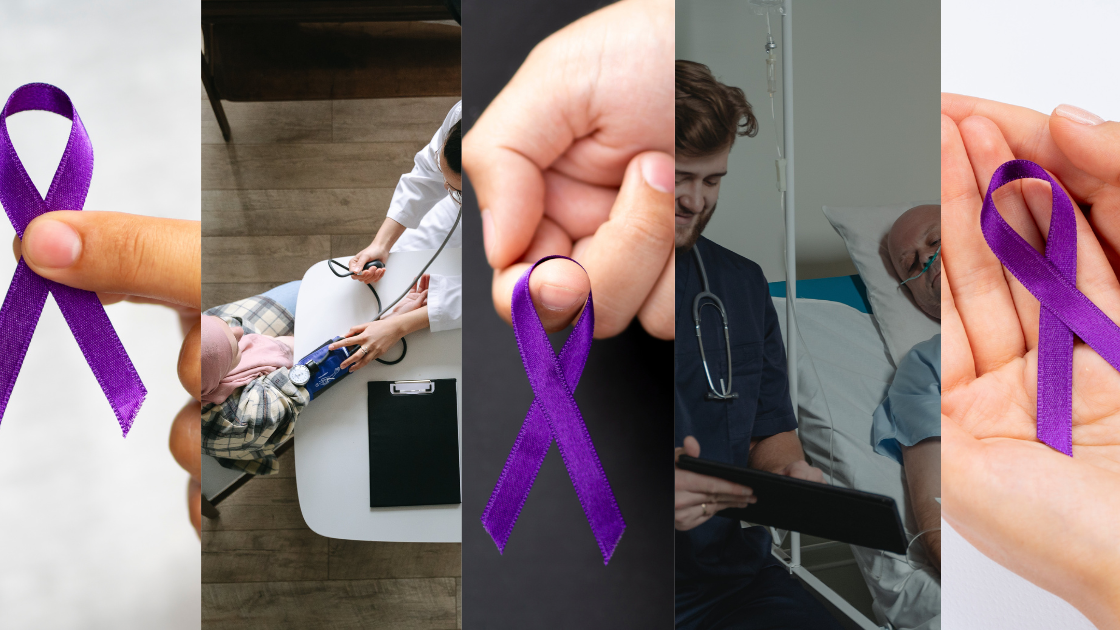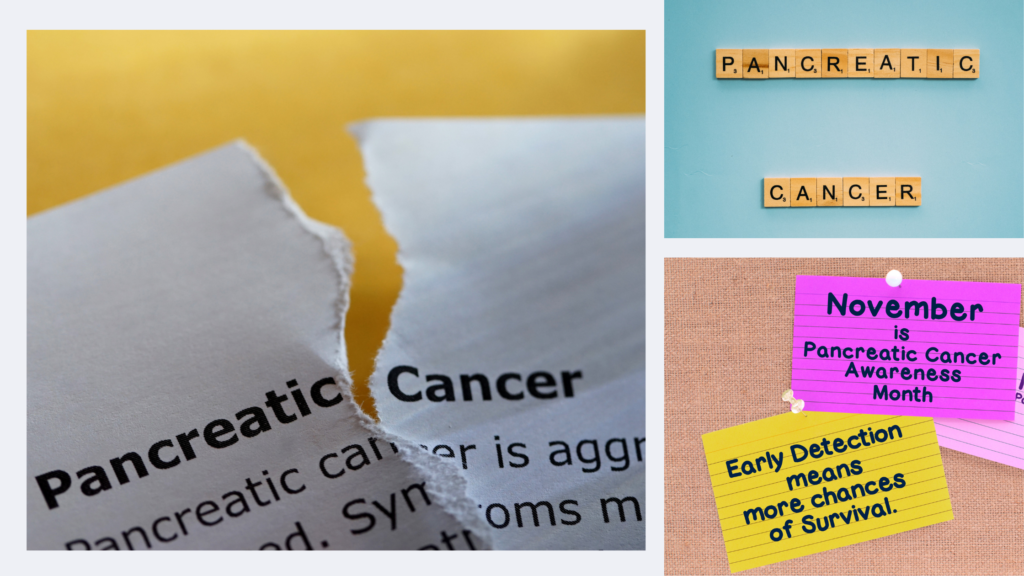The Significance of Pancreatic Cancer Awareness Month

Pancreatic cancer remains one of the leading causes of cancer-related deaths worldwide (Yang et al., 2019). While the exact causes of pancreatic cancer are not fully understood, it is crucial to spread awareness about the risk factors associated with this disease. Currently, the mortality rate for pancreatic cancer is higher than that of many other cancers, making early detection and treatment critical. Source: According to worldwide cancer statistics in 2018, pancreatic cancer was the seventh leading cause of cancer death. During Pancreatic Cancer Awareness Month, it is essential to educate ourselves and others about this highly malignant tumour. By doing so, we can encourage individuals to take proactive steps in managing their health and seek appropriate medical care if they experience any symptoms or have risk factors associated with pancreatic cancer.
Yang, J., Cong, X., Ren, M., Sun, H., Liu, T., Chen, G., Wang, Q., Li, Z., Yu, S., & Yang, Q. (2019, July 24). Circular RNA hsa_circRNA_0007334 is Predicted to Promote MMP7 and COL1A1 Expression by Functioning as a miRNA Sponge in Pancreatic Ductal Adenocarcinoma. https://scite.ai/reports/10.1155/2019/7630894
One of the main challenges in combating pancreatic cancer is the late stage at which it is usually diagnosed. Patients often do not experience symptoms until the disease has advanced, leading to a low survival rate. This emphasizes the importance of raising awareness about the early signs and symptoms of pancreatic cancer, as well as advocating for more research and development of early detection methods.
During Pancreatic Cancer Awareness Month, it is important to educate the public about the risk factors and symptoms associated with pancreatic cancer.
This includes emphasizing the importance of early detection and seeking medical attention promptly if any concerning symptoms arise. By doing so, individuals can seek appropriate medical care and potentially diagnose pancreatic cancer in its early stages, when treatment options are more effective, and chances of survival are higher. Furthermore, Pancreatic Cancer Awareness Month serves as a reminder to healthcare professionals to remain vigilant and consider pancreatic cancer as a possibility when evaluating patients with suggestive symptoms.

Understanding Pancreatic Cancer:
Pancreatic cancer is a type of cancer that starts in the pancreas, an organ that helps to digest food and produce hormones. It is one of the deadliest forms of cancer, with only about 10% of people surviving five years after diagnosis. It’s often asymptomatic in its early stages, making it challenging to detect. As the disease progresses, symptoms may include unexplained weight loss, abdominal pain, jaundice, and changes in stool or urine color.
Early Detection: The Best Remedy
Early detection is a game-changer when it comes to pancreatic cancer. Being aware of the symptoms and risk factors is crucial. Common symptoms include unexplained weight loss, abdominal pain, jaundice, and changes in stool or urine color.
Risk factors for pancreatic cancer include:
- Smoking
- Obesity
- Diabetes
- Chronic pancreatitis
- Family history of pancreatic cancer
If you have any of these risk factors, your doctor may recommend that you get screened for pancreatic cancer. Screening tests include blood and imaging tests such as MRIs and CT scans.
Insights from Senior Pancreatic Cancer Doctors
Pancreatic cancer is a complex disease, but we are making progress in understanding it and developing new treatments," said Dr. David, director of the Lustgarten Foundation Pancreatic Cancer Research Center at Cold Spring Harbor Laboratory. "Early detection is still key, so it is important to be aware of the risk factors and talk to your doctor if you have any concerns.
Dr. David Director of the Lustgarten Foundation Pancreatic Cancer Research CenterPancreatic cancer is a challenging disease, but there are things that people can do to reduce their risk," said Dr. Christine, chief medical officer of the Pancreatic Cancer Action Network. "These include quitting smoking, maintaining a healthy weight, and eating a healthy diet.
Dr. Christine Chief Medical OfficerWe need to do more to support research into pancreatic cancer," said Dr. Daniel, director of the Translational Genomics Research Institute at the Translational Genomics Research Institute. "This includes funding research and clinical trials and making it easier for patients to participate in these trials.
Dr. Daniel Director of the Translational Genomics Research InstituteWarriors: Pancreatic Cancer Survivor Stories
Ben Greenberg, Works at Cancer Treatment Centers of America
Eight months ago, my wife of 23 years and mother of my 2 children was diagnosed with pancreatic cancer. What do you do when you’re faced with the impossible? Today, thanks to an unparalleled oncology team at @nyulangone, and all our best friends and family, Janine rang the bell after the completion of her final chemo session – cancer no longer detected. My wife is the strongest and bravest human being I have ever met. She’s a reluctant inspiration to me and everyone close to her.
Kim Bradshaw shares her Dad’s story
On how their hearts were broken when his pancreatic cancer was diagnosed too late for life-saving surgery. The cancer had spread like wildfire. Only three weeks after diagnosis, we were told nothing more could be done.
Read it here https://bit.ly/46mDozW

The Role of Research
Research is the key to unlocking the mysteries of pancreatic cancer. Scientists and medical professionals worldwide are tirelessly working to find new treatment options and early detection methods. Survience is making significant contributions by connecting patients with researchers and facilitating the flow of information.
Participating in research can help patients’ voices reach the right researchers, leading to breakthroughs in treatment and care. It’s an opportunity to be part of something bigger, a force for change in the world of pancreatic cancer.
Here are several ways you can actively participate in pancreatic cancer research initiatives:
Clinical Trials: Many research studies and clinical trials are ongoing to test new treatments and early detection methods. If you or a loved one is diagnosed with pancreatic cancer, consider enrolling in a clinical trial to contribute to medical advancements.
Donations: Support organizations and institutions conducting pancreatic cancer research by making donations. Even a small contribution can go a long way in funding critical research efforts.
Advocacy: Get involved in advocacy groups dedicated to pancreatic cancer. These groups work to raise awareness, influence policies, and promote research funding.
Volunteer: Many organizations and research institutions welcome volunteers who can assist with various tasks, from fundraising to patient support.
Participate in Surveys and
Studies: Keep an eye out for opportunities to participate in surveys or studies related to pancreatic cancer.
Sign up and let your voices be heard!
Join the movement this November and help make a difference in the fight against Pancreatic cancer.
Survience: A Beacon of Hope
Survience is a Market Research and Consulting firm dedicated to bringing out the true voices of patients affected by various life-threatening diseases. We enable a bridge between patients and researchers, capturing opinions and experiences through different methodologies of research data collection. By participating with Survience, in our survey initiatives, patients and caregivers can share their experiences, concerns, and ideas directly with researchers and companies. Your participation can make a significant impact by ensuring that the voices of patients reach the right researchers, leading to advancements in diagnosis, treatment, and support.
As Pancreatic Cancer Awareness Month unfolds, let’s commit to making a difference. Together, we can raise awareness, inspire early detection, and support those affected by this disease. By sharing stories, gaining insights from experts, and participating in research, we can honor those who have battled pancreatic cancer and work toward a brighter future for all.